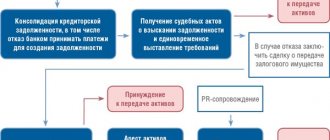ST 206 of the Criminal Code of the Russian Federation.
1. Capturing or holding a person as a hostage, committed for the purpose of forcing the state, organization or citizen to perform any action or refrain from performing any action as a condition for the release of the hostage, is punishable by imprisonment for a term of five to ten years.
2. The same acts committed: a) by a group of persons by prior conspiracy; b) has become invalid; c) with the use of violence dangerous to life or health; d) using weapons or objects used as weapons; e) in relation to a known minor; f) in relation to a woman who is known to the perpetrator to be pregnant; g) in relation to two or more persons; h) for mercenary reasons or for hire - shall be punished by imprisonment for a term of six to fifteen years with restriction of freedom for a term of one to two years.
3. Acts provided for in parts one or two of this article, if they were committed by an organized group or caused by negligence the death of a person or other grave consequences, are punishable by imprisonment for a term of eight to twenty years, with restriction of freedom for a term of one to two years. .
4. Acts provided for in parts one or two of this article, if they entailed the intentional infliction of death on a person, are punishable by imprisonment for a term of fifteen to twenty years with restriction of freedom for a term of one to two years or life imprisonment. Note. A person who frees a hostage voluntarily or at the request of the authorities is exempt from criminal liability unless his actions contain another crime.
Commentary to Art. 206 Criminal Code
1. The objective side is characterized by alternatively provided actions: a) capturing a person as a hostage, i.e. unlawful violent action that involves restricting against a person’s will his freedom to choose his place of stay; b) holding a person as a hostage, i.e. unlawful forcible obstruction of a person in his choice of his place of stay. Methods of capture and retention can be different (direct use of physical or mental violence, deception, taking advantage of the victim’s helpless state, etc.).
2. The crime is considered completed from the moment the person is actually deprived of his freedom.
3. The subjective side is also characterized by the goal of forcing the state, organization or citizen to perform any action or refrain from performing any action as a condition for the release of the hostage.
4. Part 4 implies liability for hostage-taking involving the murder of the captured person or other persons; qualifications in combination with Art. 105 of the Criminal Code is not required.
5. Note to Art. 206 of the Criminal Code provides the basis for exemption from criminal liability for this crime in connection with active repentance.
6. The delimitation of hostage-taking from kidnapping (Article 126 of the Criminal Code) and unlawful deprivation of liberty (Article 127 of the Criminal Code) (especially if actions against the victim are motivated by mercenary motives) should be carried out according to the object of the assault, the correct determination of which should be facilitated by establishing the fame of the place maintenance of the victim. Accordingly, when the victim is kidnapped and held in an unknown place and the fact of his abduction is unknown to the general public, then the act constitutes kidnapping (unlawful imprisonment); if the victim is kidnapped and held in a known place, open to the public, this constitutes hostage taking.
Second commentary to Art. 206 of the Criminal Code of the Russian Federation
1. The objective side is characterized by two alternative actions: capturing or holding a hostage.
Hostage taking is an unlawful forcible restriction of the freedom of at least one person, committed openly or secretly, then, as a rule, with an open message about it and with the setting of conditions for release.
Taking a hostage, qualified under Part 1, is accompanied by violence that is not dangerous to life or health, expressed in striking, beating, tying, holding hands, i.e. in such violence that did not entail the consequences provided for in Art. 115 of the Criminal Code.
Holding a hostage means forcibly preventing the return of his freedom, keeping him in a room that he (the hostage) cannot leave on his own.
2. The crime is over from the moment the victim is deprived of his actual freedom. A failed attempt to take a hostage is classified as an attempted crime.
3. The subjective side is characterized by direct intent and a special purpose - to force the state, organization or citizen to perform any action or refrain from performing any action as a condition for the release of the hostage (to ensure departure from the country, to transfer a large sum of money; demands for political, property, nationalistic, religious, criminal nature, etc.).
The desire of a person to protect his rights and interests in this way is combined in these cases with a violation of the established procedure. Therefore, such acts can be qualified under Art. 330 CC.
4. The subject of the crime is a person who has reached the age of 14 years.
5. Parts 2,3 and 4 contain qualifying and specially qualifying features.
6. Note to Art. 206 provides conditions for the release from criminal liability of a person who voluntarily or at the request of the authorities released a hostage, if his actions do not constitute another crime.
Hostage taking in the law of the Russian Federation
Article 206 of the Criminal Code of the Russian Federation regulates the taking of a hostage:
"1. Capturing or holding a person as a hostage, committed for the purpose of forcing the state, organization or citizen to perform any action or refrain from performing any action as a condition for the release of the hostage, -
shall be punished by imprisonment for a term of five to ten years.
2. The same acts committed:
a) by a group of persons by prior conspiracy;
b) with the use of violence dangerous to life or health;
c) using weapons or objects used as weapons;
d) in relation to a known minor;
e) in relation to a woman who is known to the perpetrator to be pregnant;
f) in relation to two or more persons;
g) for mercenary reasons or for hire, -
shall be punished by imprisonment for a term of six to fifteen years.
3. Acts provided for in parts one or two of this article, if they were committed by an organized group or caused by negligence the death of a person or other grave consequences, -
shall be punishable by imprisonment for a term of eight to twenty years.
Note. A person who frees a hostage voluntarily or at the request of the authorities is exempt from criminal liability unless his actions contain another crime.”
The fight against hostage-taking is carried out on the basis of the International Convention on the Taking of Hostages, adopted by the UN General Assembly in 1979, so these crimes are international in nature. Crime impinges on public safety.
In the article, the purpose of the crime is the commission of certain actions by representatives of the state, organizations or citizens as a condition for the release of the hostage. It is the specificity of the goal that distinguishes the crime provided for in the article under comment from other crimes also related to the unlawful deprivation of a person’s freedom.
The crime is considered completed from the moment the hostage is captured, as well as if a person holds (i.e. prevents the release) a hostage already captured by other persons, regardless of the duration of the hold.
Hostage is an individual captured and (or) forcibly held as a means of achieving satisfaction of the demands made by the perpetrators.
Hostage taking is an unlawful forcible restriction of the freedom of at least one person, accompanied by subsequent open communication about this and the setting of conditions for release. Hostage taking, qualified under Part 1 of Art. 206 of the Criminal Code, is accompanied by violence that is not dangerous to life or health.
Holding a hostage means forcibly preventing the return of his freedom, keeping him in a room or other place that he cannot freely leave.
The condition for the release of a hostage is a demand addressed to the state, organization or citizen to perform any action or refrain from performing any action (to ensure departure from the country, to transfer a certain amount of money; demands of a political, property, nationalist, religious, criminal nature and etc.).
The taking of a hostage can be carried out both openly and secretly, with or without the use of physical violence (for example, luring a hostage through deception to the place where he is being held).
Taking a hostage, as a rule, is associated with the threat of harm to his life or health in the event of failure to comply with the demands presented to the state, organization or citizen.
To qualify a crime, the nature of the demand does not matter, whether it is legal or illegal.
Threats of murder or infliction of grievous bodily harm when taking a hostage or detaining him, expressed either to a representative of the authorities or the public, or to the captured person, do not require independent qualification.
The intentional murder of a hostage or the intentional infliction of harm to his health is qualified independently in conjunction with the above article.
Similar in disposition to clause “z” of Part 2 of the article is clause “z” of Part 2 of Art. 126 of the Criminal Code (kidnapping of a person for mercenary reasons), when demands of a mercenary nature are presented not to the victim, but to third parties. To qualify actions related to the satisfaction of material demands, the article requires that they be presented openly, with the expectation that they will become known to the public and the authorities, while when a person is kidnapped, the criminal puts forward his demands secretly, not wanting them to received publicity and became known to the authorities.
The crime provided for in this article is committed with direct intent. If actions that began as a kidnapping (Article 126 of the Criminal Code) develop into a hostage-taking (for example, presenting certain demands to law enforcement officers when they block a criminal along with a kidnapped person with a threat to deal with the kidnapped person if they are not fulfilled), then they are qualified according to set of crimes.
The subject of the crime is a person who has reached the age of 14.
A person who frees a hostage voluntarily or at the request of the authorities is exempt from criminal liability only for the actions provided for in the commented article. If, when taking a hostage, actions provided for in other articles of the Criminal Code were committed (causing harm to health, deliberate destruction of someone else’s property, criminal violation of the rules governing the manufacture, acquisition and use of weapons, ammunition, explosives, organization of an illegal armed group or participation in it, etc.) d.), then the release of the hostage does not relieve him from criminal liability for these actions.
The note to Article 206 of the Criminal Code of the Russian Federation states: “A person who voluntarily or at the request of the authorities frees a hostage is exempt from criminal liability if his actions do not contain another crime.” We are talking about three special grounds for exemption from criminal liability:
voluntary release of a hostage;
release of a hostage at the request of the authorities;
absence of other elements of crime in the actions of the perpetrator.
In contrast to release on the basis of the note to Article 126, release from liability in the event of hostage taking in accordance with the note to Article 206 applies not only to the voluntary release of the hostage, but also to the release of the captured person at the request of the authorities.
The voluntary release of a hostage is a release that is carried out by the person who captured him on his own initiative, despite the opportunity that this person had to continue to hold the captured person. Voluntariness in this case is characterized by the fact that the perpetrator finally refused to hold the hostage in his power and, of his own free will, stopped the ongoing crime he had committed. Release cannot be considered voluntary if the invader, in the process of resisting the legitimate authorities, was forced to release the hostage, fearing for his own fate, because he considered further resistance hopeless.
The criminal law does not say anything about the point at which a person’s actions can be regarded as the voluntary release of a hostage. In this regard, the Plenum of the Supreme Court of the Russian Federation, in a resolution dated July 23, 1997 in the case of R., indicates that R.’s actions cannot be regarded as voluntary “since the actual release of the victim took place after the conditions set by the kidnappers were fulfilled, when their goal was achieved and the meaning of further holding the hostage turned out to be lost. Under such circumstances, R. cannot be released from criminal liability on the basis of the notes to Articles 126 and 206 of the Criminal Code of the Russian Federation.” In this regard, the literature rightly emphasizes that when the invader’s demands are met, his release from criminal liability “becomes not just meaningless, but, on the contrary, illegal and unfair.”
The release of a hostage at the request of the authorities takes place in cases where the perpetrator fulfills the demands of the authorities, refuses to resist the authorities and voluntarily releases the victim.
The motives that guided the guilty person when making the decision to release the hostage are not important for qualification.
The absence of another crime in the actions of the perpetrator means that when taking a hostage before his release, he did not commit another crime. This could be harm to the health of the hostage or other persons, beatings, murder or other acts committed by the criminal(s) in the process of taking the hostage(s). For these acts, hostage takers are subject to criminal liability.
In the literature there are proposals aimed at improving the practice of applying exemption from criminal liability according to the notes to Articles 126 and 206 of the Criminal Code of the Russian Federation. They are addressed to the Supreme Court of the Russian Federation, its Plenum is invited to adopt a resolution in which “it is necessary to clarify that when considering cases of kidnapping and hostage-taking in courts, it is necessary to establish the actual goal(s) of the crime and resolve the question of whether this goal has been achieved and to what extent, and also what circumstances influenced this. It is also necessary to determine the period after which the release cannot be recognized as voluntary (for example, three days), and indicate how the condition on crimes accompanying kidnapping or hostage-taking should be interpreted.”
Article 206 of the Criminal Code of the Russian Federation regulates the taking of a hostage:
"1. Capturing or holding a person as a hostage, committed for the purpose of forcing the state, organization or citizen to perform any action or refrain from performing any action as a condition for the release of the hostage, -
shall be punished by imprisonment for a term of five to ten years.
2. The same acts committed:
a) by a group of persons by prior conspiracy;
b) with the use of violence dangerous to life or health;
c) using weapons or objects used as weapons;
d) in relation to a known minor;
e) in relation to a woman who is known to the perpetrator to be pregnant;
f) in relation to two or more persons;
g) for mercenary reasons or for hire, -
shall be punished by imprisonment for a term of six to fifteen years.
3. Acts provided for in parts one or two of this article, if they were committed by an organized group or caused by negligence the death of a person or other grave consequences, -
shall be punishable by imprisonment for a term of eight to twenty years.
Note. A person who frees a hostage voluntarily or at the request of the authorities is exempt from criminal liability unless his actions contain another crime.”
The fight against hostage-taking is carried out on the basis of the International Convention on the Taking of Hostages, adopted by the UN General Assembly in 1979, so these crimes are international in nature. Crime impinges on public safety.
In the article, the purpose of the crime is the commission of certain actions by representatives of the state, organizations or citizens as a condition for the release of the hostage. It is the specificity of the goal that distinguishes the crime provided for in the article under comment from other crimes also related to the unlawful deprivation of a person’s freedom.
The crime is considered completed from the moment the hostage is captured, as well as if a person holds (i.e. prevents the release) a hostage already captured by other persons, regardless of the duration of the hold.
Hostage is an individual captured and (or) forcibly held as a means of achieving satisfaction of the demands made by the perpetrators.
Hostage taking is an unlawful forcible restriction of the freedom of at least one person, accompanied by subsequent open communication about this and the setting of conditions for release. Hostage taking, qualified under Part 1 of Art. 206 of the Criminal Code, is accompanied by violence that is not dangerous to life or health.
Holding a hostage means forcibly preventing the return of his freedom, keeping him in a room or other place that he cannot freely leave.
The condition for the release of a hostage is a demand addressed to the state, organization or citizen to perform any action or refrain from performing any action (to ensure departure from the country, to transfer a certain amount of money; demands of a political, property, nationalist, religious, criminal nature and etc.).
The taking of a hostage can be carried out both openly and secretly, with or without the use of physical violence (for example, luring a hostage through deception to the place where he is being held).
Taking a hostage, as a rule, is associated with the threat of harm to his life or health in the event of failure to comply with the demands presented to the state, organization or citizen.
To qualify a crime, the nature of the demand does not matter, whether it is legal or illegal.
Threats of murder or infliction of grievous bodily harm when taking a hostage or detaining him, expressed either to a representative of the authorities or the public, or to the captured person, do not require independent qualification.
The intentional murder of a hostage or the intentional infliction of harm to his health is qualified independently in conjunction with the above article.
Similar in disposition to clause “z” of Part 2 of the article is clause “z” of Part 2 of Art. 126 of the Criminal Code (kidnapping of a person for mercenary reasons), when demands of a mercenary nature are presented not to the victim, but to third parties. To qualify actions related to the satisfaction of material demands, the article requires that they be presented openly, with the expectation that they will become known to the public and the authorities, while when a person is kidnapped, the criminal puts forward his demands secretly, not wanting them to received publicity and became known to the authorities.
The crime provided for in this article is committed with direct intent. If actions that began as a kidnapping (Article 126 of the Criminal Code) develop into a hostage-taking (for example, presenting certain demands to law enforcement officers when they block a criminal along with a kidnapped person with a threat to deal with the kidnapped person if they are not fulfilled), then they are qualified according to set of crimes.
The subject of the crime is a person who has reached the age of 14.
A person who frees a hostage voluntarily or at the request of the authorities is exempt from criminal liability only for the actions provided for in the commented article. If, when taking a hostage, actions provided for in other articles of the Criminal Code were committed (causing harm to health, deliberate destruction of someone else’s property, criminal violation of the rules governing the manufacture, acquisition and use of weapons, ammunition, explosives, organization of an illegal armed group or participation in it, etc.) d.), then the release of the hostage does not relieve him from criminal liability for these actions.
The note to Article 206 of the Criminal Code of the Russian Federation states: “A person who voluntarily or at the request of the authorities frees a hostage is exempt from criminal liability if his actions do not contain another crime.” We are talking about three special grounds for exemption from criminal liability:
voluntary release of a hostage;
release of a hostage at the request of the authorities;
absence of other elements of crime in the actions of the perpetrator.
In contrast to release on the basis of the note to Article 126, release from liability in the event of hostage taking in accordance with the note to Article 206 applies not only to the voluntary release of the hostage, but also to the release of the captured person at the request of the authorities.
The voluntary release of a hostage is a release that is carried out by the person who captured him on his own initiative, despite the opportunity that this person had to continue to hold the captured person. Voluntariness in this case is characterized by the fact that the perpetrator finally refused to hold the hostage in his power and, of his own free will, stopped the ongoing crime he had committed. Release cannot be considered voluntary if the invader, in the process of resisting the legitimate authorities, was forced to release the hostage, fearing for his own fate, because he considered further resistance hopeless.
The criminal law does not say anything about the point at which a person’s actions can be regarded as the voluntary release of a hostage. In this regard, the Plenum of the Supreme Court of the Russian Federation, in a resolution dated July 23, 1997 in the case of R., indicates that R.’s actions cannot be regarded as voluntary “since the actual release of the victim took place after the conditions set by the kidnappers were fulfilled, when their goal was achieved and the meaning of further holding the hostage turned out to be lost. Under such circumstances, R. cannot be released from criminal liability on the basis of the notes to Articles 126 and 206 of the Criminal Code of the Russian Federation.” In this regard, the literature rightly emphasizes that when the invader’s demands are met, his release from criminal liability “becomes not just meaningless, but, on the contrary, illegal and unfair.”
The release of a hostage at the request of the authorities takes place in cases where the perpetrator fulfills the demands of the authorities, refuses to resist the authorities and voluntarily releases the victim.
The motives that guided the guilty person when making the decision to release the hostage are not important for qualification.
The absence of another crime in the actions of the perpetrator means that when taking a hostage before his release, he did not commit another crime. This could be harm to the health of the hostage or other persons, beatings, murder or other acts committed by the criminal(s) in the process of taking the hostage(s). For these acts, hostage takers are subject to criminal liability.
In the literature there are proposals aimed at improving the practice of applying exemption from criminal liability according to the notes to Articles 126 and 206 of the Criminal Code of the Russian Federation. They are addressed to the Supreme Court of the Russian Federation, its Plenum is invited to adopt a resolution in which “it is necessary to clarify that when considering cases of kidnapping and hostage-taking in courts, it is necessary to establish the actual goal(s) of the crime and resolve the question of whether this goal has been achieved and to what extent, and also what circumstances influenced this. It is also necessary to determine the period after which the release cannot be recognized as voluntary (for example, three days), and indicate how the condition on crimes accompanying kidnapping or hostage-taking should be interpreted.”








